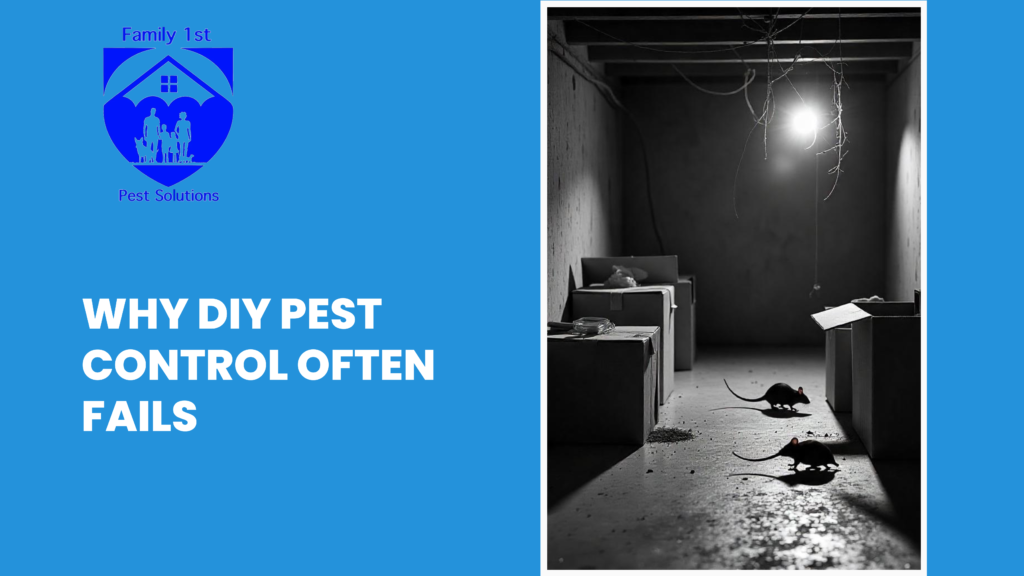From misidentifying pests to using ineffective treatments, many homeowners find themselves dealing with recurring infestations, wasted money, and even health hazards.
Let’s explore the top reasons why DIY pest control fails and when it’s time to call in a professional.
1. Misidentifying the Pest
One of the most common mistakes in DIY pest control is not knowing exactly what you’re dealing with. Many pests — especially insects — look similar but require completely different treatment methods.
For example:
- Carpenter ants vs termites: Misidentifying these can lead to serious structural damage.
- Fleas vs bed bugs: These require different chemical treatments and lifecycle targeting.
Without proper identification, your DIY treatment may miss the real problem entirely.
2. Using Ineffective Products
Store-bought pest sprays and traps might kill a few bugs on contact, but they often don’t address the source of the infestation. Worse, over-the-counter solutions can contain lower concentrations of active ingredients, making them far less effective than professional-grade options.
DIYers may:
- Overusing chemicals causes resistance among pests.
- Choose the wrong product for the wrong stage of the pest lifecycle.
- Fail to apply treatments in the right locations (e.g., behind walls or baseboards).
3. Ignoring the Root Cause
Pests enter homes for a reason: food, water, shelter, or easy access. Killing the visible pests doesn’t address what’s attracting them.
Common oversights include:
- Not sealing cracks or crevices.
- Leaving standing water or food crumbs.
- Poorly stored pet food or garbage.
Until the root cause is resolved, the pests will likely return.
4. Underestimating Infestations
A few ants in the kitchen or a mouse in the garage might not seem like a big deal, but small sightings often indicate larger, hidden infestations.
DIY pest control usually only tackles what’s visible. However, pests often:
- Nest inside walls, attics, or crawlspaces.
- Multiply rapidly (e.g., a single female roach can produce hundreds of offspring).
- Remain dormant and then reappear after treatment.
This leads to a cycle of short-term fixes with no long-term success.
5. Lack of Safety Knowledge
Improper use of pesticides can pose serious health risks to your family and pets. Many homeowners don’t read labels carefully or understand application guidelines.
Common mistakes include:
- Overapplying chemical treatments.
- Using indoor products outdoors and vice versa.
- Storing pesticides improperly.
Professionals are trained in safe handling, reducing risk of contamination or accidental exposure.
6. No Access to Professional Equipment
Licensed exterminators have access to high-grade products and equipment that homeowners can’t purchase. These include:
- Bait stations
- Non-repellent chemicals
- Heat and moisture sensors
- Professional-grade traps
These tools allow for deeper, more effective treatment, especially for hidden or recurring infestations.
7. Long-Term Costs Add Up
While DIY might feel cheaper up front, repeated failures can cost you more over time. Buying multiple products, repairing pest-related damage, and even medical bills from bites or contamination all add up.
In contrast, a one-time professional treatment plan may offer:
- Guaranteed results
- Scheduled follow-ups
- Prevention strategies to keep pests out for good
When to Call a Professional
You should consider hiring a professional pest control service when:
- You’ve tried DIY methods with no results.
- Pests keep returning despite treatment.
- You’re dealing with dangerous pests (e.g., wasps, rodents, termites).
- The infestation is widespread or in hard-to-reach areas.
A qualified exterminator will:
- Identify the pest and entry points.
- Use targeted, eco-friendly solutions.
- Offer advice on prevention and maintenance.
Final Thoughts
DIY pest control may work for the occasional fly or spider, but serious infestations require serious solutions. Missteps in identification, treatment, and prevention can cost you more in the long run — and potentially put your health at risk.
Investing in a professional pest control service ensures effective, long-lasting protection for your home and peace of mind for your family.

